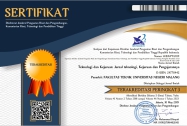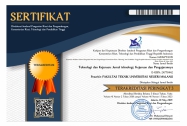The Influence of Formation of Mechanical Skills and Numerical Literacy Skills on Welding Practicum of Problem Based Learning Model on Mechanical Engineering Education Study Program Students
Abstract
Keywords
Full Text:
PDFReferences
Alves, J.L., & Duarte, T.P. 2011. Reseach Skills Enhancement in Future Mechanical Engineers. ResearchGate, 1 (1), 20-26.
American Welding Society (AWS). 1998. Specification for Welding Procedure and Performance Qualification. Amerika: American National Standards Institute.
Argaw, A.S., Haile, B.B., Ayalew, B.T., & Kuma, S.G. 2017. The Effect of Problem based Learning (PBL) Instruction on Students’ Motivation and Problem Solving Skills of Physics. EURASIA Journal of Mathematics Science and Technology Education, 13 (3), 857—871.
Arifin, A., & Sutopo. 2017. Analisis Kompetensi Tenaga Kerja Terampil Bidang Pemesinan Presisi. Prosiding Seminar Nasional Jurusan Pendidikan Teknik Mesin, Hal 92—101.
Atkinson, H., & Pennington, M. 2012. Unemployment of Engineering Graduates: the key issues. Engineering Education, 7 (2), 7—15.
Barry, D.M., Kanematsu, H., Fukumura, Y., Ogawa, N., Okuda, A., Taguchi, R., & Nagai, H. 2009. International Comparison for Problem Based Learning in Metaverse, ReseachGate.
Bennett, D. 2016. Enacting Stategies for Graduate Employability: How Universities can Best Support Students to Develop Generic Skills. Final Report (Part A), Deakin University: Learning & Teaching.
BPS. 2018. Pertumbuhan Produksi Industri Manufaktur triwulan II-2018. (Online), (www.bps.go.id), diakses 26 Agustus 2018.
Braman, D., Kahan, D.M., Peters, E., Wittlin, M., Slovic, P., Ouellette, L.L., & Mandel, G. 2012. The Polarizing Impact of Science Literacy and Numeracy on Perceived Climate Change Risks. Nature Climate Change 2, 732—735.
Buyung. 2014. Pengaruh Model Pembelajaran Problem Solving dan Kemampuan Numerik Terhadap Penguasaan Literasi Matematika Di SMP. Jurnal Teknologi Pendidikan, 16 (1), 1—12.
Bynner, J., & Parsons, S. 2006. New light on Literacy and Numeracy: Summary Report. London: NRDC Institute of Education.
Connor, H., Dench, S., & Bates, P. 2000. An Assessment of Skill Needs in Engineering. Brighton: Department for Education and Employment.
Cristiansen, E., Kuure, L., Morch, A., & Lindstrom, B. 2013. Problem-Based Learning for The 21st Century. Denmark: Aalborg University Press.
Durrani, N., & Tariq, V. N. 2012. The Role of Numeracy Skills in Graduate Employability. Education + Training.
EU SKILLS PANORAMA. 2014. Focus on Literacy and Numeracy Skills Analytical Highlight. Eropa: ICF and Cedefop of the European Commission.
Fine, N. 2017. Skills & Demand in Industry 2017 Survey. UK: The Institution of Engineering and Technology.
Gackowski, Z.J. 2003. Case/Real-Life Problem-Based Learning with Information System Projects. Journal of Information Technology Education, 2 (2), 258—265.
Galloway, P.D. 2007. The 21st-Century Engineer: A Proposal for Engineering Education Reform. Chapter Seven, 46—51.
Garba, A.G., Musa, D.J., & Salihu, K.T. 2015. Development and Validation of Mechanical Engineering Trade Skills Assessment Instrument for Sustainable Job Security in Yobe State. Journal of Education and Practice, 6 (16), 1—9.
Haddouchane, Z. A., Ajana, S., Zergout, I., Faraj, K., & Bakkali, S. 2018. A Study of the Adequacy of Training in Mechanical Egineering in Relation to Business Profiles. International Journal of Higher Education, 7 (6), 173—190.
Harun, N.F., Yusof, K.M., Jamaludin, M.Z., & Hassan, A.A.H.S. 2012. Motivation in problem-Based Learning Impementation. Procedia Sosial and Behavioral Sciences, 56 (2012), 233—242.
Hmelo-Silver, C. E. H., & Barrows, H. S. 2006. Goals and Strategies of a Problem-based Learning Facilitator. Interdisciplinary Journal of Problem-Based Learning, 1 (1), 21—39.
Isaac, S., & Michael, W.B. 1984. Handbook In Research And Evaluation (2nd ed). San Diego, CAA: Edits.
Jo, S., & Ku, Ja-Ok. 2011. Problem Based Learning using real-time data in Science Education for the Gifted. Gifted Education International, 27 (3), 263—273.
Kabouridis, G., Giannopoulos, G.I., & Tsirkas, S.A. 2014. Improving the Skills and Employability of Mechanical Engineering Students Via Practical Exercise. World Transactions on Engineering and Technology Education, 12 (4), 694—700.
Kelley, A., & Searle, J. 2000. Literacy and Numeracy on the Motorway: a case study of the effects of the inclusion of literacy and numeracy competencies within the civil construction industry training package. Australia: The Queensland Centre of the ALNARC.
Kelley, T. R., & Kellam, N. 2009. A Theoretical Framework to Guide the Re-Engineering of Technology Education. Journal of Technology Education, 20 (2), 37—49.
Kelly, E., McGuinness, S., & O’Connell, P.J. 2012. Literacy, Numeracy and Activation among the Unemployed. Sandford: National Adult Literacy Agency.
Kojmane, J., & Aboutajeddine, A. 2016. Strenghthening Engineering Design Skills of First-year University Students Under Resources Constraints. International Journal of Mechanical Engineering Education, 0 (0), 1—17.
Martin, L., West, J., & Bill, K. 2008. Incorporating Problem-Based Learning Strategies to Develop Learner Autonomy and Employability Skills in Sports Science Undergraduates. Journal of Hospitality, Leisure, Sport and Tourism Education, 7 (1), 18—30.
Meeks, L., Kemp, C., & Stephenson. J. 2014. Standards in Literacy and Numeracy: Contributing Factors. Autralian Journal of Teacher Education, 39 (7), 106—139.
Motyl, B., Baronio, G., Uberti, S., Speranza. D., & Filippi, S. 2017. How will Change the Future Engineers’ Skills in the Industry 4.0 Framework? A Questionnaire Survey. Procedia manufacturing, 11, 1501—1509.
Mukhadis, A. 2013. Evaluasi Progam pembelajaran Bidang Teknologi “Terminologi, Prosedur pengembangan Program dan Instrumen”. Malang: Bayumedia Publishing.
Parsons, S., & Bynner, J. 1997. Numeracy and Employment. Education + Training, 39 (2), 43—51.
Pedersen, S., & Liu, M. 2002. The Effects of Modeling Expert Cognitive Strategies During Problem-Based Learning. J. Educational Computing Research, 26 (4), 353—380.
Poikela, E., & Nummenmaa, R. 2006. Understanding Problem-Based Learning. Finland: Tampere University press.
Quinn, R. 2011. Literacy and Numeracy for Learning and Life. Dublin 1: Department of Education and Skills.
Riduwan. 2014. Dasar-dasar Statistika. Bandung: Alfabeta.
Rusman. 2014. Penerapan Pembelajaran Berbasis Masalah. Edutech, 13 (1), (2), 211—230.
Sanguinetti, J., & Hartley, R. 2000. Building Literacy and Numeracy into Training: A synthesis of recent research into the effects of integrating literacy and numeracy into training packages. Australia: The Queensland Centre of the ALNARC.
Sani, A. R. 2014. Pembelajaran Saintifik untuk Implementasi Kurikulum 2013. Jakarta: Bumi Aksara.
Shomos, A., & Forbes, M. 2014. Literacy and Numeracy Skills and Labour Market Outcomes in Australia. Canberra: Productivity Commission Staff Working Paper.
Shyi-Huey Wu. 2005. Employability and Effective Learning Systems in Higher Education. Ninth Quality in Hinger Education International Seminar in Collaboration with ESECT and The Independent. Birmingham 27th—28th January.
Smith, M., Duncan, M., & Cook, K. 2013. Graduate Employability: Student Perceptions of PBL and its Effectiveness in Facilitating their Employability Skills. Practice and Evidence of Scholarship of Teaching and Learning in Higher Education, 8 (3), 217—240.
Sofyan, H., & Komariah, K. 2016. Pembelajaran Problem Based Learning dalam Implementasi Kurikulum 2013 Di SMK. Jurnal Pendidikan Vokasi, 6 (3), 260—271.
Sudjimat, A. D. 2014. Perencanaan Pembelajaran Kejuruan “Dari Kajian Empirik Dikembangkan sesuai Inovasi Kurikulum 2013 untuk Pembelajaran Abad XXI”. Malang: UM Press.
Tome, E. 2007. Employability, Skills and Training in Portugal (1988-2000): Evidence from Official Data. Journal of European Industrial Training, 31 (5), 336—357.
Widarto., Wijanarka, B.S., & Paryanto. 2008. Teknik Permesinan untuk SMK. Jakarta: direktorat Jenderal Manajemen Pendidikan Dasar dan Menengah, Direktorat Pembinaan Sekolah Menengah Kejuruan, Departemen Pendidikan Nasional.
Widharto, S. 2007. Menuju Juru Las Dunia. Jakarta: Pradnya Paramita.
Wiryosumarto, H., & Okumura, T. 2014. Teknologi Pengelasan Logam. Jakarta Timur: Balai Pustaka.
Wulandari, B., & Sarjono, H.D. 2013. Pengaruh Problem-Based Learning terhadap Hasil Belajar Ditinjau dari Motivasi Belajar PLC di SMK. Jurnal Pendidikan Vokasi, 3 (2), 178—191.
DOI: http://dx.doi.org/10.17977/um031v45i12022p80-90
Refbacks
- There are currently no refbacks.
Copyright (c) 2023 Teknologi dan Kejuruan: Jurnal Teknologi, Kejuruan, dan Pengajarannya
Teknologi dan Kejuruan: Jurnal Teknologi, Kejuruan, dan Pengajarannya
E-ISSN 2477-0442 (online)
Contact
Faculty of Engineering, Universitas Negeri Malang (UM)
Jl. Semarang No 5 Malang 65145, Building H5, 1st Floor.
Homepage: http://journal2.um.ac.id/index.php/teknologi-kejuruan
Email: teknologikejuruan.ft@um.ac.id

This work is licensed under a Creative Commons Attribution 4.0 International License.



2.png)
1.png)
1.png)
1.png)
4.png)
1.png)
.png)

3.png)
1.png)
1.png)


